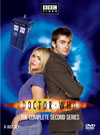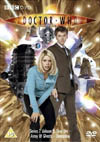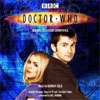DVD Extras (box sets only) include:
But the achievement this time around is more of craftsmanship than writing per se, as many of Russell's quieter stories contain sharper, wittier dialogue, more poignantly-written character moments, and more engaging plot stratagems. "Doomsday" is fantastic entertainment, but not quite the great story that "The Impossible Planet" (story no. 178) or "Rise of the Cybermen" (story no. 176) are. In the end, it will have to duke it out with "School Reunion" (story no. 174) for third place in the season's rankings.
Thirdly, it makes no bones about the fact that this is Rose's last story, and raises instead some very disturbing questions about how she might achieve her exit. Very excellent. And the show's creators remember to materialize the TARDIS properly to start the story off right. Sweet. Yeah, we're stuck with a present day Earth, England, London setting for the third adventure in a row, but with the consolation of finally being able to ditch Rose, I'll not complain, and this setting can and does manage to become the most interesting place in the universe once the various story elements start to kick in. Davies falls back on some of his most staple elements to build his story. Once more, the Doctor is seen to sit and flip channels on the TV in the living room, delivering a montage of international news clips to get the sense that the latest threat to the neighbourhood is actually a global problem. While I might normally get tired of yet another shameless TV love-in from old T., this time there actually happens to be someone that I know in the sequence, which is the only thing that seems to make these types of montages worthwhile. Barbara Windsor, comedienne co-star of many a Carry-On film, makes a delightfully fun and whimsical cameo. Thanks to her, the montage becomes worthwhile this time. Camille Coduri is back to give the real Jackie Tyler her most substantial showing for the season. Camille's timing is excellent, making Jackie one of the all-time great comic foils of the show, with superb assists from her co-stars. Nice job. The Doctor makes an enjoyable return to the TARDIS to get a "Ghostbusting" story beat going, complete with some bizarre scientific gadgetry and Murray Gold's first significant original composition for the story. Extra movement for the TARDIS, once more featuring the kind of proper materialization that was so lacking earlier in the season, adds to a highly satisfying section of the adventure. Yvonne Hartman makes a somewhat strange character to lead the main group of humans dealing with the threats from the unknown. Technically the Doctor is a prisoner during his time with her, but all the usual boring dynamics associated with that are thankfully thrown out the window here. Yvonne's a people person, and doesn't do that. Good for her. Her role tends more towards a combination of exposition point-person and slightly threatening Doctor's foil in the early stages, where her character works very well. Sadly, she's pretty useless later on when the invaders are revealed, and what we need is someone who can lead the troops to defend us. We need a character who'll say things like: "Chap with wings. Five rounds rapid." And mean it. The growing legend of Torchwood suggested that it deserved better. The list of great returning characters for this story continues as Mickey Smith comes back in his most heroic and butch incarnation yet. Sadly, there is so much going on with so many different characters that Mickey gets a far less central role than one could hope for, and doesn't really get the time to show off his most charming, humorous side. Still, the story is far better off with him than without him, and Noel Clarke's wonderful presence is thoroughly welcome. And the commentary for episode one gives us yet another helping of Noel's humorous banter. Bonus! We are also blessed with the presence of Freema Agyeman, this time playing the look-a-like cousin of future companion Martha Jones. Freema does an excellent job of both phases of her minor role, managing to bring the kind of horror of "The Moonbase" (story no. 33) and its partially-cybernized humans to a new level. The on-screen representation of the actual cybernization process is once again silly though, and remains director Graeme Harper's most significant loss of marks. Primarily, it's too fast to believably succeed at the kind of delicate operation that it's supposed to represent. Thankfully, the slice-and-dice whirly-gigs of "Rise of the Cybermen" (story no. 176) do not make a return appearance, but instead we have showers of metal sparks flying all over the instant a cybernization victim wanders off-screen, as though metal were being cut or welded, accompanied by instant screams. I wouldn't have thought that the victims were made of any metal yet, or that they would scream just from seeing something happen to an empty cyber-body. Exactly what is supposed to be going on here? I suspect the filmmakers aren't really thinking of that, but rather simply have frightening the audience in mind instead, and the sequence is much less believable, and therefore less frightening, because of it. The plot's weakest point is probably in the middle of the middle act, specifically where the Doctor and many of his friends play prisoner to more than just the Torchwood group. Davies seems to be grasping at straws to find reasons why the invaders don't just do away with them. Although the story is still working fairly well as a mystery with regards to its sci-fi / physics / enemy mythology / character motivation elements, it really doesn't provide the engaging stratagems between the Doctor's party and the invaders that make such stories great. Instead we alternate between a series of friendly chats that show a Doctor making little attempt to save himself or his friends from nasty ends, and the empty spectacle of huge battles between extras with whom the audience has made no emotional investment. Not bad for an average outing, but other stories this season have done better. Things improve as the cavalry turns up to break the Doctor's information-gathering prisoner streak - and too bad he required the cavalry to do it instead of coming up with something on his own. That said, this is a pretty decent contingent of returning characters. Jake Simmonds looks like he could make a decent replacement for the UNIT era's Sgt. Benton, while Shaun Dingwall's increasingly confident, take-charge version of Pete Tyler allows him to fill Brigadier Lethbridge-Stewart's usual functions and deliver another enjoyable tour-de-force performance. Awesome. These parallels might suggest that Mickey is playing a role similar to.... James Bond? Nah, Noel Clarke has too much heart, making him way cooler than Bond. ;-)
And even here, you have to wonder if it isn't making nonsense of at least some of the techno-babble attempting to make the crossing between parallel universes a rare, pseudo-impossible, unrepeatable event. I'm not convinced. As long as we want the Doctor to step into his adventures heroically AND travel through time, we will need parallel universes and parallel histories to allow there to be stakes and consequences in the adventures, even more so when confining ourselves unnecessarily to Earth settings. While this may be only the third story in 180 to openly deal with the subject after "Inferno" (story no. 54) and "Rise of the Cybermen" (story no. 176), the latter of which helped enormously to set this story up, I predict we will see more and more parallel universe stories as Doctor Who matures with our own understanding of time, choice, the cosmos, and physics - be it quantum or otherwise.
"Hey, we should call it that: `Pete's World'."Would the real Mondas please stand up? And spin rapidly to give us an eastern sunset?Sadly, this tale seems to be putting two decent theories of linked plots in Season 28 to rest. Not only does New Earth not turn out to be the future Mondas of classic Doctor Who mythology, but now neither does the parallel Earth from "Rise of the Cybermen". Somehow, both planets now seem diminished, reduced to mere copies of the original, each with less cultural significance than before. This season's Cybermen now also seem to be only a parallel version, rather than past versions of the originals. So we haven't really seen the definitive genesis of the Cybermen we all used to know, and these new ones have as much freedom as they want to be different. Cool as they are, I prefer the ones that kept more than just the organic brain.
Clash of the Titanic VillainsYes, we have Daleks and Cybermen in the same story together, interacting with each other for the first time. Sadly, there doesn't seem to be quite enough time to explore all the possibilities, particularly in this limited Earthly setting. However, it must be noted that this is a totally unfair contest between them. The Cybermen are just out of the cradle in this tale, barely having mounted laser weapons on their arms in the three years since their race was born. The Daleks here, on the other hand, have developed over thousands, if not millions of years, gone to the end of the universe and back again through time. It's too easy to see that Daleks will have the technological edge, and rule the day. Put advanced space-faring Cybermen against the Daleks just after their Genesis on Skaro, and you'll probably have a different outcome.Which brings up an interesting question. Exactly what year is this story supposedly set in? If "Rise of the Cybermen" occurred in February 2006, and three years passed since then, it must be 2009 on Pete's World as the adventure unfolds. Does that mean it's 2009 in Jackie's home universe? Also, what happened to the year that passed between "Rose" (story no. 161) and "Aliens of London" (story no. 164)? Of the four Dalek stories I've seen since the 2005 re-birth of the show, this one remains my favourite. Their curiosity and scientific industry come back to the forefront, making them interesting sci-fi characters once more. And the story manages to explain just enough of their new "magic" to make it passably believable, retroactively helping last season's adventures somewhat. Best of all, the Daleks just seem to have their act together here better than elsewhere, and even without a lot of screen time, this is a decent showing for them. It isn't long before the writer's real purpose of the parallel barriers reveals itself - all a device to permanently lose Rose while giving the audience an emotionally satisfying ride. David Tennant and Billie Piper get some heavily emotional scenes to sink their teeth into, which they do with gusto. Rose's end of it is far too sappy for my tastes, not least of which because I've never been enamoured with her or her nebulous relationship with the Doctor to want to invest in it in the depth that the producers would like their audience to. And although it might be obvious why excesses of mascara and make-up are a huge mistake, and why scenes of blubbering companions are another big mistake, Rose/Piper proves definitively why the combination is a disaster of ugliness. At least there is a real loss happening, preventing this from being one of those old scenes we used to get with characters who blubber over nothing significant at all. David Tennant is moving in his performance, while providing enough restraint to remain tasteful and dignified. Nice.
I was secretly pleased to finally see the back of Rose, but a bit sad that she was taking Mickey and Pete and Jackie with her where they too would no longer be allowed to appear on the show. For me, that was the real sadness of the story. Those were the characters I would miss. After a nearly perfect emotional sign-off and satisfying concluding moment, the story failed to end where it should have. Complete improbability had dumped an irritating woman in a bride's dress into the TARDIS, presumably to tease us to tune in for yet another Christmas special in which she would be a co-star. At times like this, I suspect Davies aims so hard for developing the female audience that he forgets what the show is supposed to be about. Exploration of the cosmos reduced to a holiday wedding engagement? Uggh! I resigned myself to sitting through another dud episode that couldn't think beyond domestic Earth events. I'd never heard of over-hyped comedienne Catherine Tate before, but her timing with David Tennant was atrociously unfunny in the little burp of a scene that they have together. I suspect this is another of Davies' innumerable stunts that rely on people who know who Tate is already and carry positive memories into the viewing experience. Sadly, this adventure's exit from its highly emotional conclusion is quite disjointed.
International Titles:Deutsch:
Magyar:
Français:
Русский:
Italiano:
Season 28 Rankings:
"Doomsday" is available on DVD. Click on the Amazon symbol for the location nearest you for pricing and availability:
Note: The full season sets contain commentaries, behind-the-scenes featurettes, and other extras. The smaller volumes only feature the plain episodes. Comments on this article are welcome. You may contact the author from this page:
|










